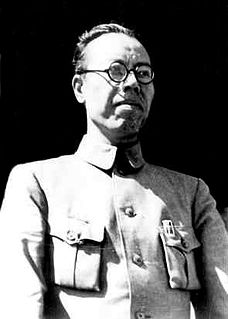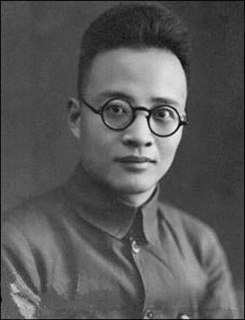External links
- (in Chinese) 6th Central Committee of the CPC, People's Daily Online.
- Resolution on certain questions in the history of our party Adopted on April 20, 1945
| Major organs | ||
|---|---|---|
| Departments | ||
| Institutions | ||
| Commissions | ||
| Leading Groups | ||
| Sittings | ||
The 6th Central Committee of the Communist Party of China was in session from 1928 to 1945, during most of the Chinese Civil War, and during the Second Sino-Japanese War. It held seven plenary sessions in this period. It was formally preceded by the 5th Central Committee of the Communist Party of China. It was the first central committee to have Mao Zedong as a high-ranking member. It was succeeded by the 7th Central Committee.
It had 23 members and 13 alternate members. [1]
Its first plenary session elected the 6th Politburo of the Communist Party of China in Moscow in 1928, as it would not have been safe to have the session in the Republic of China.

The Central Secretariat of the Chinese Communist Party is a body serving the Politburo of the Chinese Communist Party and its Standing Committee. The secretariat is mainly responsible for carrying out routine operations of the Politburo and the coordination of organizations and stakeholders to achieve tasks as set out by the Politburo. It is empowered by the Politburo to make routine day-to-day decisions on issues of concern in accordance to the decisions of the Politburo, but it must consult the Politburo on substantive matters.

Lǐ Lìsān was an early leader of the Chinese communists, a leader of the Chinese Communist Party from 1928 to 1930, member of the Politburo, and later a member of the Central Committee.
The 28 Bolsheviks (二十八个半布尔什维克) were a group of Chinese students who studied at the Moscow Sun Yat-sen University from the late 1920s until early 1935, also known as the "Returned Students". The university was founded in 1925 as a result of Kuomintang's founder Sun Yat-Sen's policy of alliance with the Soviet Union, and was named after him. The university had an important influence on modern Chinese history by educating many prominent Chinese political figures. The most famous of these were collectively called the 28 Bolsheviks.

Wang Ming was a senior leader of the early Communist Party of China (CPC) and the mastermind of the famous 28 Bolsheviks group. Wang was also a major political rival of Mao Zedong during the 1930s, opposing what he saw as Mao's nationalist deviation from the Comintern and orthodox Marxist–Leninist lines. According to Mao on the other hand, Wang epitomized the intellectualism and foreign dogmatism Mao criticized in his essays "On Practice" and "On Contradiction". The competition between Wang and Mao was a reflection of the power struggle between the Soviet Union, through the vehicle of the Comintern, and the CPC to control both the direction and future of the Chinese revolution.

Qin Bangxian, better known as Bo Gu was a senior leader of the Chinese Communist Party and a member of the 28 Bolsheviks.

Wang Jiaxiang, one of the senior leaders of the Communist Party of China in its early stage and a member of the 28 Bolsheviks. Wang held a variety of high-level posts in the Party: during the Civil War he was the director of the Red Army's General Office, upon the founding of the People's Republic of China he was the first ambassador to the Soviet Union, and then became the first head of the Party's International Department.

Xiang Zhongfa was one of the early senior leaders of the Communist Party of China (CPC).

The leader of the Central Committee of the Chinese Communist Party is the highest-ranking official and head of the Chinese Communist Party (CCP). Since 1982, the leader of the CCP is equivalent to the office of the General Secretary of the Central Committee. Since its formation in 1921, the leader's post has been titled as Secretary of the Central Bureau (1921–1922), Chairman, and General Secretary.
The 7th Politburo of the Chinese Communist Party was elected at the 1st Plenary Session of the 7th Central Committee on June 19, 1945, consisting of 13 members. It was actively preceded by the 6th Politburo of the Chinese Communist Party. There were additions to the membership in 1955.
The 6th Politburo of the Chinese Communist Party was elected by the 6th Central Committee of the Chinese Communist Party in Moscow on July 19, 1928, during the Chinese Civil War. It was followed by the 7th Politburo of the Chinese Communist Party.
The 5th Politburo of the Chinese Communist Party was elected by the 5th Central Committee of the Chinese Communist Party in Wuhan in 1927.
The 12th Central Committee of the Chinese Communist Party was in session from September 1982 to November 1987. It held seven plenary sessions. It was securely succeeded by the 13th Central Committee.
The 11th Central Committee of the Chinese Communist Party was in a 5 year session from 1977 to 1982. The 10th Central Committee of the Chinese Communist Party preceded it. It held seven plenary sessions in the 5-year period. It was formally succeeded by the 12th Central Committee of the Chinese Communist Party.
The 10th Central Committee of the Chinese Communist Party was in session from 1973 to 1977. It was most certainly preceded by the 9th Central Committee of the Chinese Communist Party. It held three plenary sessions in the 4-year period. It was formally succeeded by the 11th Central Committee of the Chinese Communist Party.
The 8th Central Committee of the Chinese Communist Party was in session from 1956 to 1969. It was preceded by the 7th Central Committee of the Chinese Communist Party. It held 12 plenary sessions in this period of 13 years. It was the longest serving central committee ever held by the Communist Party.
The 7th Central Committee of the Chinese Communist Party was in session from 1945 to 1956. It was a product of the convening of the 7th National Congress of the Chinese Communist Party. It held six plenary sessions in this 11 year period. It began in June 1945, before the end of the Second Sino-Japanese War, and the resumption of the Chinese Civil War. This committee would be succeeded by the 8th Central Committee.
The 5th Central Committee of the Communist Party of China was in session from 1927 to 1928. It was set into motion by the 5th National Congress. It was followed by the '6th Central Committee of the Communist Party of China'.
The 4th Central Executive Committee of the Chinese Communist Party was in session from 1925 to 1927, and was the last central committee to have the term 'executive' in its title. It was set into motion by the 4th National Congress of the Chinese Communist Party. This would be followed by the 5th Central Committee of the Chinese Communist Party.
A List of Historical makeup of the Politburo Standing Committee of the Communist Party of China since 1927–present.

Ren Bishi was a military and political leader in the early Chinese Communist Party.